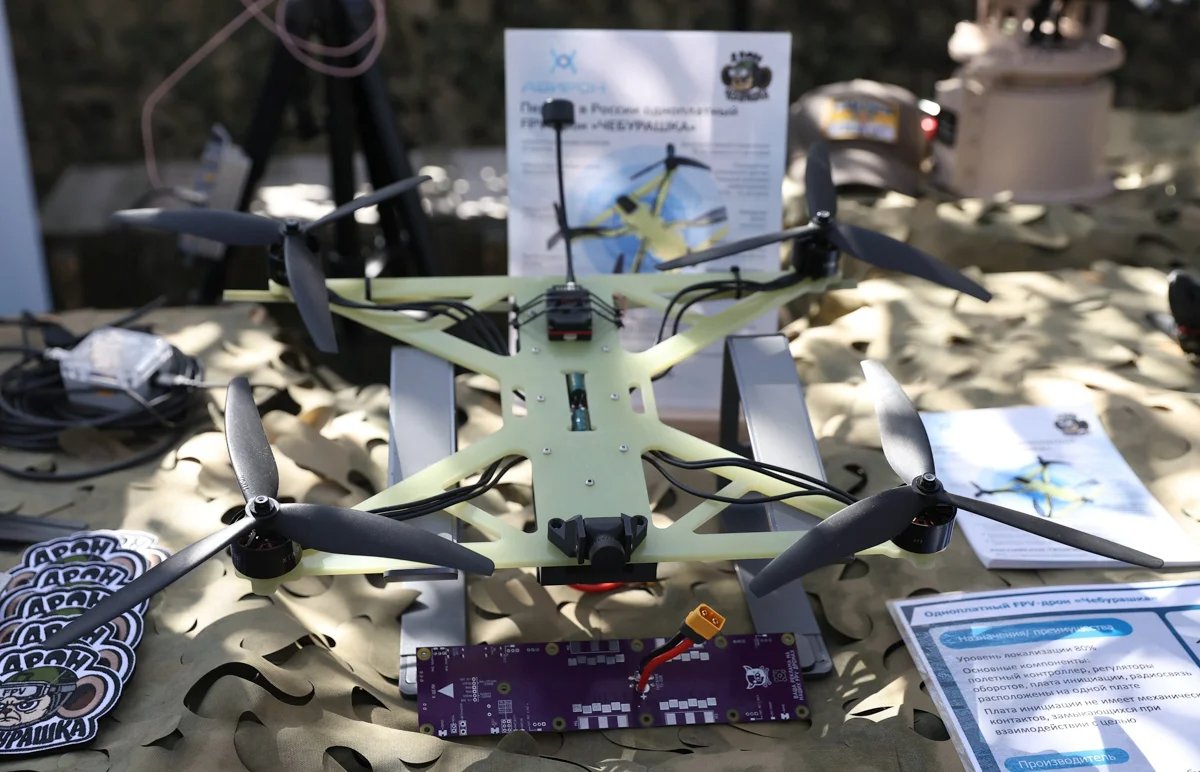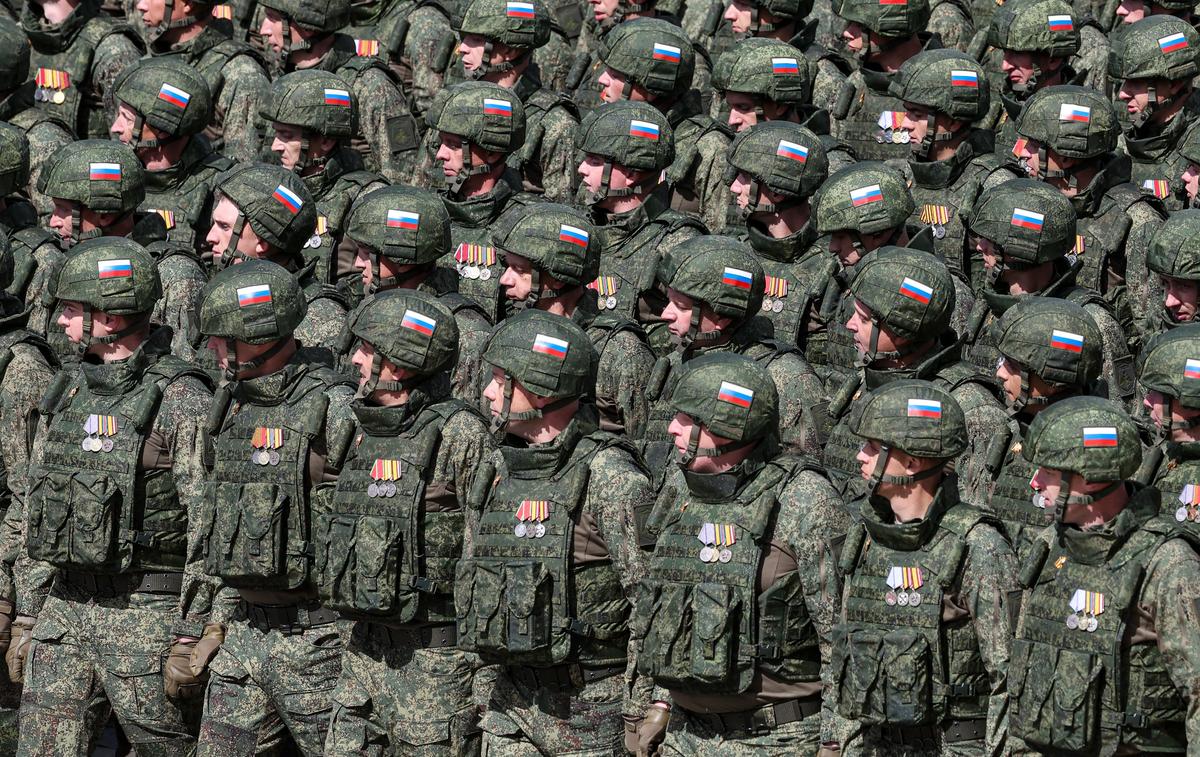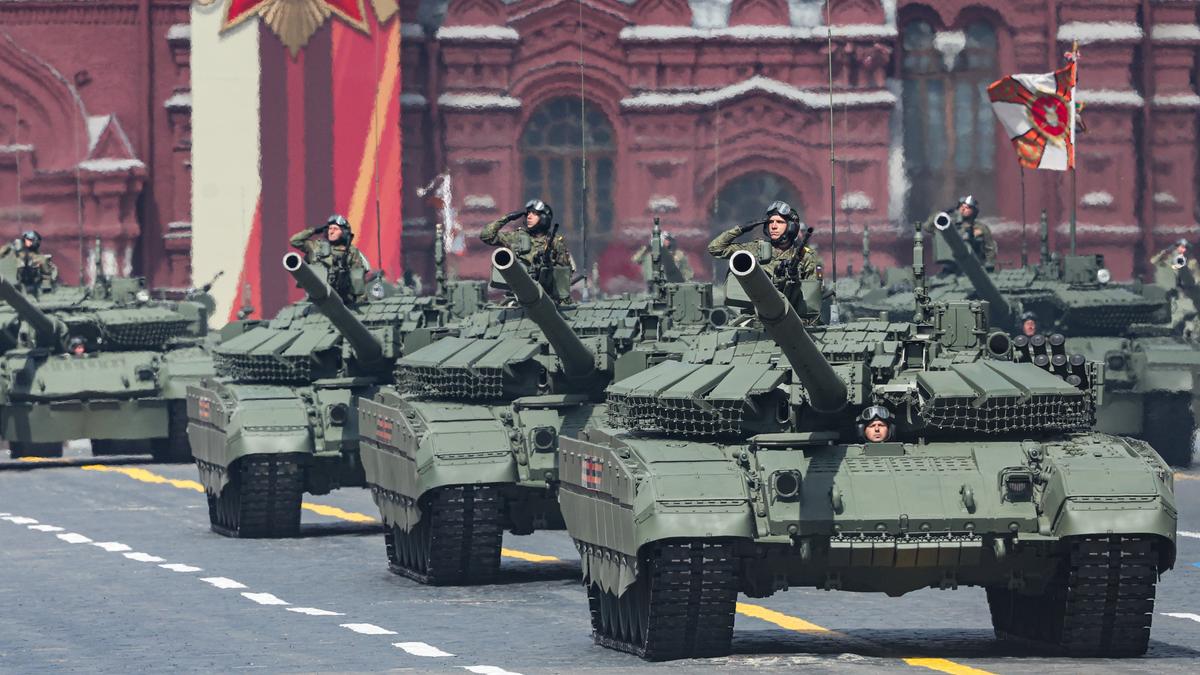The Russian government is painting itself into a corner with its decision to spend 38% of the federal budget on its military and security apparatus over the next three years. Though such an unprecedented level of military spending is slowly rotting the country’s economy from within, a sudden reduction in defence expenditure is likely to result in a serious recession.
In the draft budget for 2026–2028 that the Russian government submitted to the State Duma last Monday, some 12.9 trillion rubles (€133.5 billion) is earmarked to fund the war in Ukraine, a perfunctory reduction on current expenditure that allows officials to fulfil the pledge made by Vladimir Putin earlier this year to reduce defence spending.
However, the 1.5% reduction is small enough to fall within the margin of error, and spending on the military-industrial complex in 2027–2028 is due to exceed the 2025 figure.
Though Putin ordered that military spending should be cut due to a budget shortfall in June, the financial situation eased somewhat over the summer, and the Finance Ministry decided that it could plug the gap simply by raising VAT and a number of other taxes, a necessary move given that annual spending on the military-industrial complex, the security services and the police is now to account for 38% of the budget.
The authorities now plan to increase spending on national defence by 1 trillion rubles (€10.5 billion) over the next three years, a rise of 2.6%, compared to the first four years of the war.
According to Russian economist Vadim Baranov*, the publishing of a “war budget” is necessary to show the world that “Russia hasn’t changed its domestic or foreign policy priorities” and demonstrates to the international community that Putin is not planning to draw back military spending due to budget deficit pressure, or, at least, “not yet, it seems”.
That said, as the government began working on the new budget, senior officials sounded a warning at June’s St. Petersburg International Economic Forum that it was time for Putin to make a choice between the war and the economy. That choice has now been made. “The steady shift in prioritising spending on law enforcement certainly harms the prospects for long-term growth,” Baranov said.
Stagnation tomorrow
The Russian economy was booming until late last year, largely due to the huge amounts of money being pumped into the military-industrial complex from state coffers. However, that momentum began to wane about a year ago, and since early 2025, there have been localised crises in several key sectors including construction, transport, metallurgy, agriculture, and coal mining.
Oil production fell by 3.5% from January to May, and Russia posted one of its lowest revenue figures for the sale of raw materials in August since the start of the war. The energy sector, which accounts for a fifth of Russia’s total budget revenue, has also been adversely affected, with oil and gas revenue falling by 20% year-on-year in the first eight months of this year.
There are numerous reasons why the Russian economy might stagnate during the country’s fourth year of war. Sanctions have led to reduced exports and have made imports more expensive. Labour shortages plague all sectors of the economy due to both the large number of workers who have been mobilised and the estimated 1 million Russians who have left the country since 2022.

A Russian Cheburashka single-wing drone on display at an exhibition of weapons and military equipment during the Zapad-2025 military exercises. Photo: Valery Sharifulin / IMAGO / Scanpix
There’s also the high inflation rate, which is being driven by the country’s vast military expenditure. In attempting to rein in inflation by raising interest rates, the Central Bank has made borrowing prohibitively expensive for just about everybody, bar the military-industrial complex, which receives state subsidies and has access to loans at preferential rates.
The new draft budget shows that none of these problems will be resolved in 2026, Baranov told Novaya Europe, adding that in recent years we’ve already witnessed how labour shortages and the state burning through trillions of rubles to produce drones and missiles results in high inflation.
Interest rates will remain high, although lower than the current 17%, predicts economist Dmitry Polevoy, at 15–16% for the remainder of 2025, decreasing to 11–12% in 2026. This, combined with tax rises, will continue to stifle civilian industries, says Elina Rybakova, a senior researcher at the Peterson Institute for International Economics, while raising VAT to 22% won’t just slow down the economy even further, but would also lead to a spike in consumer goods prices, according to experts Novaya Europe consulted.
So many Russians are now economically reliant on the military-industrial complex that stopping the influx of state funding to the sector would cause a major crisis.
Rybakova warned that this would lead to “deplorable” real incomes, something the latest Russian economic forecast from the Economic Development Ministry appears to back up, predicting as it does that income growth will almost halve to just 2.1% in 2026.
Recession the day after
But even if the Kremlin completely changed course and ended the war tomorrow, so many Russians are now economically reliant on the military-industrial complex that stopping the influx of state funding to the sector would cause a major crisis.
Resource distribution is now so disproportionate and has reached such a scale that it is beginning to threaten the entire economy, Rybakova warns. After all, a similar real estate bubble in 2007 and 2008 led to the global financial crisis. The bubble in Russia’s military-industrial complex is swallowing up finance and workers needed by the country’s civilian industries, which is why it will have to be reined in at some point, according to Rybakova.

Russian servicemen take part in the annual Victory Day parade on Moscow’s Red Square, 9 May 2025. Photo: EPA / Maxim Shipenkov
However, if less money is poured into the military-industrial complex, there will be a full-fledged recession, says Alexander Kuzmin*, who heads a Russian economic research centre, who describes it as a “Catch 22” situation, which he calls “difficult to get out of and unclear how to manage”.
He and Rybakova see no other way out of this impasse than via a recession and all its associated problems: a fall in production, rising unemployment and wage cuts.
Experts have, of course, feared a recession and sharp drop in Russian GDP since the very beginning of the war, but assumed at the time that it would be due to Russia’s inability to withstand international isolation, an oil embargo and the confiscation of its foreign assets.
Instead, the state being unable to maintain its current level of funding to the military-industrial complex poses the most realistic threat to the Russian economy, and its failure to do so would likely result in the military spending bubble bursting. The scale of any recession will depend on how long the defence complex is pumped with money — the longer it goes on, the worse it will be — and which government official ends up in charge of the economy, says Rybakova.
Russian defence corporations currently see no need to make themselves competitive in other markets as long as they still receive subsidies and state-backed loans from the budget.
The normalisation of Russian foreign policy and a subsequent easing of sanctions on the country would make it easier for the Kremlin to extricate itself from the current situation, Baranov argues. Shocks will affect the military-industrial complex less if trade restrictions are eased and it can once again sell to foreign markets and create products for which there is demand among civilian industries, such as drones to be used for agriculture or forestry rather than for airstrikes, says Rybakova.
However, the economists who spoke to Novaya Europe believe that Russian defence corporations currently see no need to make themselves competitive in other markets as long as they are still receiving subsidies and state-backed loans from the budget.
There is currently a consensus among those doing well from the war that as long as it goes on, shocks can be avoided, Kuzmin said.
Kremlin spokesperson Dmitry Peskov said the same thing last week, insisting the war was to be won. Kuzmin said that the authorities would now therefore attempt to find quick fixes for the wide range of crises affecting different industries and regions, but that such an approach would make little headway into how best to manage Russia’s post-war economy.
* Name changed at contributor’s request
Join us in rebuilding Novaya Gazeta Europe
The Russian government has banned independent media. We were forced to leave our country in order to keep doing our job, telling our readers about what is going on Russia, Ukraine and Europe.
We will continue fighting against warfare and dictatorship. We believe that freedom of speech is the most efficient antidote against tyranny. Support us financially to help us fight for peace and freedom.
By clicking the Support button, you agree to the processing of your personal data.
To cancel a regular donation, please write to [email protected]

